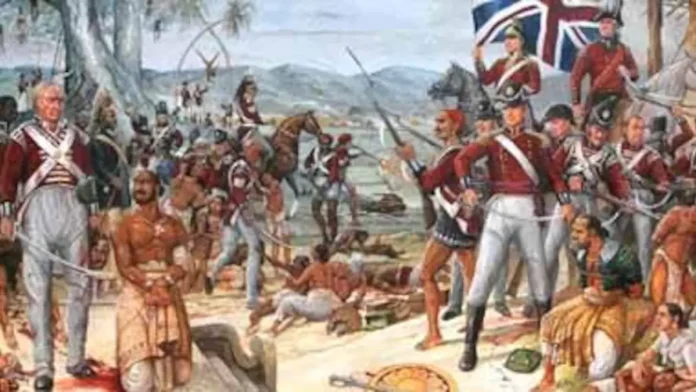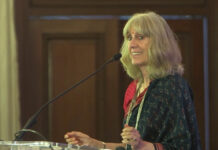Attitude of today’s British Politicians towards India
After knowing about all these crimes, how does it feel, when British Parliamentarians criticise India for its ‘far right government’ as Nadia Whittome did after the recent India visit by Boris Johnson? If anything, the Modi government is more left than right, if left means to look after the poor foremost. (Those categories right and left don’t apply to India, as Hinduism is not blind belief and ‘conservative’ but basically scientific).
By Maria Wirth
Another Parliamentarian made the outrageous insinuation that India plans a genocide of its Muslims.
Can the British get away with this? They seem to be sure that Indians either don’t know what they did to the country or they are “polite” and won’t mention it.
Meanwhile, the British play the role of ‘guardians of human rights’ and keep especially a close watch on India… like placing in its Open Doors watch list, India among the top 10 countries with the greatest persecution of Christians. It’s shameless. Indeed, a spokesperson for the British Foreign and Commonwealth Office told the ABC, when asked about reparations for Aboriginals, “We are doing our utmost to address modern day discrimination and intolerance (underlined by me).
Since the British took over the education in India in 1835, they could push their narrative very successfully. It’s truly unfortunate, that many Indians even today are more Anglophile than Indophile, which means they love England over India, and in the process do great harm to India. They don’t realise that the Westerners will use them, but won’t consider them equal.
Looting of Indian knowledge
The loot of India was not only materially. India’s profound knowledge was looted, too. First the British cut Indians off from Sanskrit, so that they couldn’t read their ancient texts any longer and then told them that half a bookshelf of English literature is worth more than all the Indian texts together. It was an incredible lie, but the Indian students could not find out. They were busy learning Britain’s illogical language.
Meanwhile, Britishers and missionaries shipped out loads of ancient Indian texts. When I googled a few years ago “How many Indian manuscripts are in Oxford university library?” I got ‘around 8000’. On the library website, there were different categories, and under astronomy, which I clicked, Varahamihira’s Brihat Samhita was listed. When recently, I asked Google the same question, I couldn’t get that website and didn’t’ get the number of 8000 any longer.
These ancient manuscripts are very valuable and are in many countries, including Russia and China, apart from England. In fact, the Russians are said to have built their first Intercontinental Ballistic Missile from ancient Indian texts which they had captured from Germany after the war. Please see this podcast from min 47.40. It’s interesting.
I want to show here one tragic example, where the British suppressed a brilliant Indian who had developed a flying machine on the basis of ancient texts. Every Indian should know his and his teacher’s name: Shivkar Bapuji Talpade and Subbaya Shastri.
Talpade was a child prodigy who had a PhD at age 13. At 15, he met Shastri, who had studied Vimanas from ancient texts and written a book on it. They both built a flying machine and demonstrated it on the beach of Bombay in 1895. It was a remote-controlled plane which reached a hight of 1500 feet and flew for 37 seconds before it crashed. 8 years later, the Wright brothers’ plane flew 12 seconds and only 120 feet high before it crashed.
Talpade tried hard to get a grant for improving his project, yet he was ridiculed and never received a grant. Still, he managed to build in his home a mercury ions engine. When the British came to know of it, they accused him of making explosives and arrested him. When he explained in court his mercury powered engine, a team of scientists stated, that a mercury powered device is impossible. They were wrong. Today NASA DOES use mercury ions engines for space travel…
Talpade was thrown into jail and several years later released on the condition, not to build any other thing. But again, he started building, this time the Rukma vimana according to ancient texts. It is rumoured, that German scientists took it secretly to Germany and built the famous Nazi Bell on the basis of it. And indeed, they look similar.
Talpade himself died at the age of 53 a heart broken man.
One certainly could speculate, that his blueprint, which he would have shown to the British for getting a grant, was studied by the British and later used by the Wright brothers. The suppression of such a bright Indian mind was highly immoral. He would have busted the British argument, that India needed them to build railways. On the contrary. Indians would have been first to develop planes and space crafts.
I read a quote by a German (I don’t remember who it was): ‘We Germans have to see the ships from India sailing past to Britain, laden with gold and riches. But we Germans won’t be left behind. We will take their knowledge…’
Several teams of German scientists came in the 1930s to Tibet and India, and Germany had an advantage in the war regarding planes and rockets. Incidentally, the USA took after WW2 about 1000 German scientists in the operation ‘paperclip’ to their country and one of them, Wernher von Braun, developed the space program of NASA. Praveen Mohan says in the video that NASA has publicly announced that mercury ion engines can provide constant acceleration, reducing travel times while increasing the efficiency.
There are several other aspects, where Britain used and exploited India, for example when 3 million Indian soldiers fought in the 2 world wars for the British, 150,000 laid down their lives, and they in all likelihood had a big role in the outcome of the war, but Britain never acknowledged this. On the contrary, it made India pay for their war.
The role of Rothschild and other merchants and aristocrats
Rothschild archive website says:
the East India company “rose to account for half of the world’s trade, particularly in basic commodities… trading mainly with China and the Indian subcontinent….
The Company became a major military and political power in India, gradually increasing the extent of the territories under its control, ruling the whole Indian subcontinent either directly or indirectly via local rulers under the threat of force by its armies.
By 1803, at the height of its rule in India, the British East India Company had a private army of about 260,000 – twice the size of the British Army.’
In 1834, Sir Thomas Fowell Buxton wrote to his daughter recalling the dinner where Nathan (Rothschild) told him of an occasion “when I was settled in London, the East India Company had 800,000 lbs of gold to sell. I went to the sale and bought it all. I knew the Duke of Wellington must have it… that was the best business I ever did.”
What does it mean, when Rothschild said “he bought it all”? Did he send money to India? This can be surely ruled out. The common British people may not have known that the company ‘paid’ for imports with taxes by Indians.
Moreover, these 800,000 pound (= 363 tons), a HUGE amount, would have been looted. How would it otherwise make sense that he said, that it was the best business he ever made…
While it is mentioned on the website that global trade was part of the Rothschild businesses from its earliest days, and the most prominent name associated with East India Company even as ‘owner’ is Rothschild, the website also says, “whilst there is no evidence that Nathan held shares”. Incidentally, today, too, Rothschilds are not mentioned in the Forbes list and very secretive about their wealth. Guesses exist from a few billions to 100 or more trillion $.
Nathan Rothschild called the British king ‘a puppet’, and said, the man who controls the empire’s money supply, controls the British empire, and meant his family. When around 1860, the German emperor Wilhelm visited the Rothschild mansion in Paris, he remarked, ‘Kings can’t afford this. It must belong to a Rothschild.’ mentioned in this video “15 things you didn’t know about the Rothschild family”.
Examples of reparations payments
Let’s come to the point that Britain, and the Company, were not at all opposed to reparations. In fact, they demanded them, for example after China lost the opium war, Hongkong had to be handed over and a sum be paid by China.
Britain and the other Allies also demanded reparations from Germany after WW1. The sum was so high, 33 billion $, that it devastated Germany’s economy. Germany paid reparations for WW1 till 2010.
After WW2, Britain and the other Allies again demanded reparations from Germany and other Axis countries, but this time mainly in kind. They dismantled industries and shipped them out, took coal and other mineral resources, took a share of the industrial production. Britain used the German war prisoners as forced labour for 2 years after the war, and Russia and France got a substantial share of German land.
The most well-known reparations are those paid by Germany to the victims of the Holocaust. Germany paid directly for the survivors and also generally to the state of Israel, so far over 80 billion $. The payments are still ongoing, and have recently been extended to include spouses of holocaust survivors who have already died.
In 2007, even second-generation Holocaust survivors approached an advocate for demanding from Germany the cost for psychotherapeutic treatment. When the German government was asked its stand, a spokesperson said, “Germany take as very seriously all matters related to Holocaust survivors”.
Class action suits have also been filed against German companies who forced Jews to work for them.
The case of the Herero and Nama tribes of Namibia.
Germany was the colonial power there between 1895 and 1918, and brutally killed 100,000 persons of those 2 tribes who had rebelled. Their descendants filed a class action suit in US and the court asked Germany to have pre-trial consultations. Germany tried to wriggle out by not accepting the court summons, but finally had to accept them. Negotiations were held between Namibia and Germany, and Germany agreed to calling it genocide, paying 1,3billion $ and apologised. The tribes, however, were not happy. They had demanded over 400 billion.
Individual compensation
In 2020, an 83-year-old man from Indonesia, whose father was shot in 1947 in front of his eyes, was paid by a Dutch court Euro 10,000.
When his lawyer was asked if the Australian Aborigines could also ask for reparations, she said, “absolutely”.
The article further says:
“The right of Indigenous peoples to remedy and reparation for what they have lost and suffered as a result of colonisation is enshrined in international law.”
A declaration adopted by the UN General Assembly in 2005 declared the “right to benefit from remedies and reparation” for victims of gross human rights violations. This echoed the Rome Statute, which established the International Criminal Court in 1998, declaring principles “relating to reparations to, or in respect of, victims, including restitution, compensation and rehabilitation.”
A case where Britain PAID reparations
In 2018, this tweet by the treasury handle of British HM shocked many in Britain and its colonies. It was deleted soon after, but the news was out that not the slaves, but their owners were compensated, among them many of today’s prominent families.
After the abolition of slavery, Britain took a loan from Rothschild to compensate the slave owners. This loan of 15 million pounds was repaid only in 2015. This galvanised several organisations into action to find out the money trail and demand reparations for the descendants of slaves. The Caribbean countries formed CARICOM, which pursues this goal and when recently Price William and Kate went to Jamaica, they were greeted with protests.
The natives of North America also became in recent time more vocal, demanding their land back, starting with Mount Rushmore.
British MP Daniel Kawczynski wants more reparations from Germany
After unification of Germany in 1990, the Allies gave up further claims for reparations for WW2. However, in recent years, the debate is reignited especially in Poland and Greece. British MP Daniel Kawczynski, of Polish origin, said he had been stunned to discover that Britain had waived its rights to any reparations following the reunification of Germany in 1990.
“It was a terrible mistake to forgo this in 1990 and it’s sending out a completely wrong signal. I think the Germans have behaved appallingly here”, he is quoted.
Where could India start?
It would make sense to start with the British Museum and the crown jewel. The mood in Europe, except maybe Britain, is coming round to the view that those treasure in European museums, should go back to where they came from.
David Cameron’s reaction in an interview to NDTV in 2010 is out of touch. However, it seems Indians so far didn’t put pressure, not even for Kohinoor.
When asked, will you give back Kohinoor? Cameron replied, “this is a question I have NEVER been asked before… and adds, that the British Museum would be empty. What an argument. It’s like a thief saying, if I return the stolen things, my own house will look bad.
Another important issue are the ancient manuscripts which were looted, even by missionaries. India needs to know which texts are there in the university libraries and which of those texts are unique and not available in India. These need to be given back.
Another obvious injustice, which easily can be addressed, is that Britain received reparations from Germany for the 2 world wars, but nothing of that went to India. India paid a huge amount and supplied a huge amount of goods, guns and animals for Britain’s wars, apart from sending 3 million soldiers, 150,000 sacrificing their lives for a war, they had nothing to do with. India not only deserves a memorial for the Indian soldiers in England, but definitely its financial share.
Next those tribes, who were incredibly declared criminal at birth, and other groups, like the weavers or the descendants of Jalanwalia Bagh massacre and of the relatively recent (1943) Bengal famine could file class action suits, like the 2 tribes from Namibia did.
Yet most important of all, since those bankers and merchants, like Rothschild, including the directors of the company, who had amassed incredible wealth, were mainly responsible for the massive suffering of the Indian masses, should not THEY, respectively their families, pay back what they looted? If they had integrity and a conscience, they would do so. But do they have a conscience?
Or are they scheming with multinational companies, like Big Pharma and Big Tech, how they can again enslave humanity and exploit them, as they did so successfully with the East India Company?
Wikipedia says that the gold reserves of Britain were in 1870, 170 tons and in 1950, 2543 tons, in spite of sending many tons of gold during WW2 to America to get weapons and 250 tons to Canada.
Incidentally, the Bank of England, owned by Rothschild, dealt with the “Council Bills”, mentioned by Prof Utsa Patnaik. It means it got real gold or forex in exchange for some paper with a Rupee amount written on it, which was redeemed by Indian taxpayers. Imagine the loot. The company NM Rothschild and sons mainly determined the gold price from 1810 till 2004.
Research needs to be done, how much gold and other valuables went to England. How the big banking families, foremost Rothschild, profited. For example, this one-time shipment of 800,000 pounds of gold ( it equals 363 tons, which surpasses the gold reserves of most countries today) which Nathan Rothschild ’bought’ or rather appropriated in 1814, is worth today over 20 billion $. Just this one shipment.
It seems Karma is catching up with Europe in our times. But will it also catch up with those, who ruthlessly forced Indians into abject poverty and starvation due to their greed and who became insanely rich? So rich, that it is said that those powerful families are behind every recession or currency devaluation and it is in all likelihood them who have “the means”, as Klaus Schwab said recently at WEF, “to build the future”.
Some 15 years ago, an Indian, Sanjeev Metha, bought the East Indian Company. I was surprised that an Indian would want to trade under this name which brings up terrible memories in India and other former colonies, and probably nostalgia in Britain.
However, it may turn out to be a boon that Mehta, who is well aware of the enslavement of India by the Company, has the reprinting rights of all records and library material. A detailed study of what has been looted, who exactly has profited, where the riches went, is needed.
It will expose those families who, without any pangs of conscience, humiliated, enslaved, tormented, starved and killed other humans for their own greed, many of whom are still insanely rich.
Reparations need to be demanded mainly from them.
At the same time, British politicians need to be more humble in dealing with India, keeping in mind their crimes and the unforgivably racist attitude of their former PM Winston Churchill, who said, “I hate Indians. They are a beastly people with a beastly religion.”
As a first and easy step, a preferential trade agreement from Britain would only be logical, after their massive loot.
This article first appeared in www.mariawirthblog.wordpress.com and it belongs to them.







